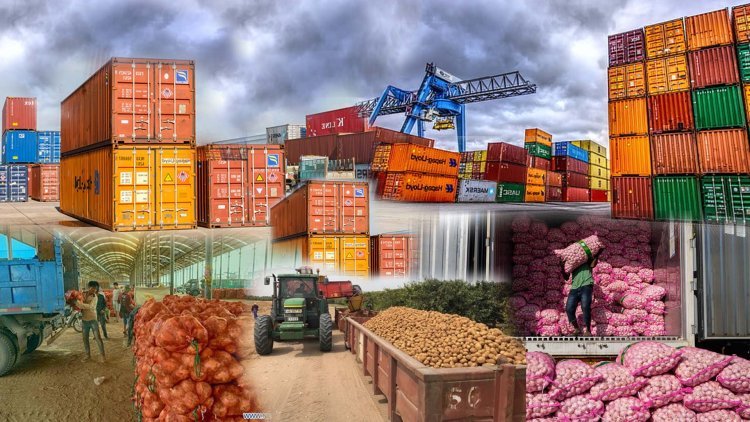Despite contributing more than a quarter of Nigeria’s GDP and providing jobs for over 70 per cent of the population, agriculture remains a weak link in the nation’s export chain, accounting for less than 10 per cent of total foreign earnings.
Stakeholders told NATIONAL ECONOMY that the country’s agricultural export performance has deteriorated sharply, plunging by 11 per cent between 2023 and 2024 — a slide they say underscores years of policy inertia, chronic underinvestment, and failure to harness value-added opportunities in a sector once celebrated as Nigeria’s economic backbone.
Citing data from the United Nations COMTRADE database, they revealed that Nigeria’s non-oil exports tumbled from $60.65 billion in 2023 to $52.36 billion in 2024, wiping out $8.29 billion in export value in just one year. The decline, driven by naira depreciation, rising logistics costs, and collapsing competitiveness, they warned, lays bare the fragility of Nigeria’s non-oil export base and its dangerous overreliance on raw commodity trade.
For many exporters, the downturn is more than a statistic, it is a daily struggle. From ginger growers in Zaria to cashew farmers in Kogi and yam exporters in Lagos, the story is one of frustration and fading hope.
Maryam Musa, a ginger exporter from Zaria, said her shipments to Europe have dropped by nearly half in the past year, citing high freight charges and bottlenecks at Nigerian ports. “Every time we prepare goods for export, the cost of logistics increases,” she lamented.
“We spend so much on transportation and documentation that by the time the produce gets to port, profit has almost vanished.”
In Kogi State, cashew farmer Mr. Sunday Olorunfemi described a similar ordeal. “We have the quality and quantity, but we can’t compete internationally because government support is weak and policies keep changing,” he told NATIONAL ECONOMY, adding that many smallholders are now abandoning exports for local sales.
For Gbenga Akhomolafe, a yam exporter based in Lagos, the weak naira has done little to help. “Even though the exchange rate looks favourable, most of us can’t access forex officially,” he said. “We pay heavily for inputs and transport, so the margins are gone before the yams leave the dock.”
To boost foreign exchange earnings, many believe Nigeria must shift its focus from exporting raw produce to value-added processing. A financial economist at Auchi Polytechnic, Zakari Mohammed, said that approach would not only increase export revenue but also create jobs. “We can’t keep shipping raw cocoa or cashew and expect to grow,” he said. “Let’s build processing clusters where farmers can turn raw produce into finished goods like chocolate, juice, or essential oils. That’s where the money is,” he stated.
The African Continental Free Trade Area (AfCFTA) also presents fresh opportunities for Nigerian exporters to access larger regional markets, but experts warn that success will depend on Nigeria’s ability to meet standards and ensure cost competitiveness. A trade policy researcher, Dr. Chika Eze, emphasised the importance of policy consistency. He said, “Today, the government encourages exports; tomorrow, it bans them. That kind of inconsistency scares investors. We need a clear, long-term export policy that businesses can trust,” he stressed.
“We have the land, we have the farmers, and we have the crops; what we don’t have is the system to move them efficiently. From farm to port, Nigeria loses billions every year because of poor logistics and lack of coordination. The Ministry of Agriculture needs to do a better job at coordinating the agriculture sector and building infrastructure for planting, growing, harvesting, storage and transporting agric produce in its entire value chain, said Dr. Ayodeji Alabi, an agricultural economist and trade consultant based in Ibadan
Industry players say the 11 per cent slump in agricultural export earnings is not a sudden shock but the result of systemic bottlenecks that have plagued Nigeria’s agribusiness ecosystem for decades. A food scientist and consultant at Releaf, an agriculture starter, Mrs. Aniette Ubong, said the solution lies in training and enforcement. According to her, “Most exporters mean well, but they lack knowledge about global standards,” she explained. “We must make export certification mandatory and support farmers with labs and testing facilities in each geopolitical zone.”
Dr. Michael Isiguzo, Managing Director, Agrinvest, said the country’s agricultural export chain remains heavily constrained by logistics inefficiencies and policy instability. “Exporters face multiple levies at ports, poor roads that destroy produce in transit, and long delays in clearance,” he told NATIONAL ECONOMY. “Without modern storage, cold-chain systems, and predictable export policies, Nigeria cannot compete with its peers in the global market.”
He further blamed limited access to finance for the decline, noting that smallholders and rural cooperatives who produce most of Nigeria’s export crops are often excluded from formal credit systems.
Infrastructure deficit further compounds the crisis. Exporters point to decaying rural roads, epileptic power supply, and inadequate processing facilities as major impediments to value addition and storage. As a result, Nigeria continues to export raw produce instead of finished or semi-processed goods that would fetch higher foreign earnings.
The federal government has also expressed concern over the low returns from agricultural exports, acknowledging that while the sector contributes substantially to national output, it generates less than $400 million in foreign exchange annually.
Minister of agriculture and food security, Senator Abubakar Kyari, speaking at the First Bank of Nigeria 2025 Agric and Export Expo in Lagos, said Nigeria must urgently transition from dependence on oil revenues to resilience built on agro-export value chains.
“The fundamentals compel that we pilot from dependence on oil rigs to resilience in food and export earnings from rural commodity exports to value-added agribusiness; from fragmented farmer credit to structured financial systems that attract significant capital, and from stereotyped perceptions to improved participation of youth in the agricultural sector,” the minister said.
Kyari noted that the government is prioritising reforms aimed at repositioning the agricultural value chain, boosting processing capacity, and supporting exporters through policy stability and access to finance. “Our objective is to make Nigerian agriculture globally competitive, not just in volume but in value,” he stated.
On the way forward, Dr. Isiguzo, said the federal government must prioritise industrial-scale processing to unlock higher export value. “Exporting raw cocoa, sesame, or cashew nuts can no longer sustain Nigeria’s forex needs,” he said. “The real earnings come from processing — from turning what we grow into products the world pays premium for.”
Similarly, Mr Kenneth Icheku, urged government agencies to streamline export procedures and harmonise tariffs to curb duplication and waste. “Exporters face too many regulatory overlaps that drive up costs and delay shipments,” he said. “We must simplify the system, digitise documentation, and make the ports truly competitive.”
Stakeholders are also calling for targeted financing windows for agribusiness exporters, including concessional loans, insurance cover for export risks, and public–private partnerships for logistics investments such as cold-chain facilities and export hubs.
On his part, Gbenga Akhomolafe, a Lagos-based yam exporter, said policy consistency will be key to restoring confidence among exporters.
The consensus is clear: Nigeria’s agricultural export earnings will remain depressed until it tackles infrastructure decay, streamlines financing, and ensures consistent policies. With better coordination among the Ministries of Agriculture, Trade, and Finance — and stronger private-sector participation — stakeholders believe Nigeria can turn its farmlands into engines of export growth.
“The global market is hungry for what Nigeria grows,” Dr. Alabi concluded. “The question is, will Nigeria finally learn to serve the global table?”





